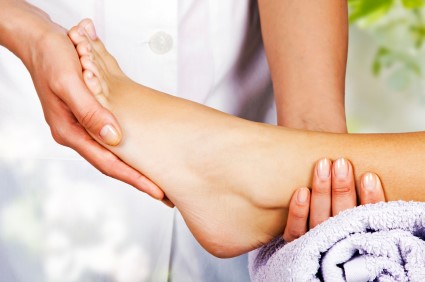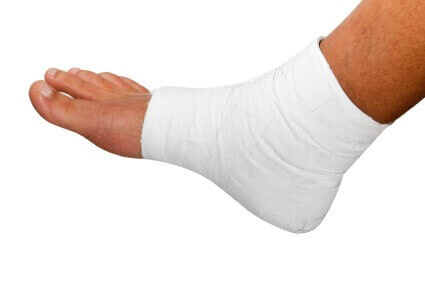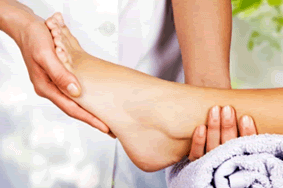





 Joel Embiid of the Philadelphia 76ers has broken the bone in his right foot and will have surgery to repair the break making this the second foot injury in less than a year for the 21-year old. Embiid originally broke his foot in June of last year, two months before he signed his rookie contract. Although he was the number three pick during the 2014 NBA draft, the center has missed most of his rookie season and will now most likely miss this upcoming season due to the surgery.
Joel Embiid of the Philadelphia 76ers has broken the bone in his right foot and will have surgery to repair the break making this the second foot injury in less than a year for the 21-year old. Embiid originally broke his foot in June of last year, two months before he signed his rookie contract. Although he was the number three pick during the 2014 NBA draft, the center has missed most of his rookie season and will now most likely miss this upcoming season due to the surgery.
Foot surgery is sometimes necessary to fix a foot ailment. If you have any concerns about your foot and ankle needs contact Dr. Richard T. Braver DPM, FACAS and Dr. Philip S. Messenger, DPM of Active Foot and Ankle Care, LLC. Our doctors will treat your foot and ankle needs.
When Is Surgery Necessary?
Foot and ankle surgery is generally reserved for cases in which less invasive, conservative procedures have failed to help with the problem. Some of the cases in which surgery may be necessary are:
What Types of Surgery Are There?
The type of surgery you receive will depend on the nature of the problem you have. Some of the possible surgeries include:
Benefits of Surgery
Although surgery is usually a last resort, it can provide more complete pain relief compared to non-surgical methods and may allow you to finally resume full activity.
Surgical techniques have also become increasingly sophisticated. Techniques like endoscopic surgery allow for smaller incisions and faster recovery times.
If you have any questions please feel free to contact our offices located in Englewood, Fair Lawn, and Riverdale, NJ. We offer the newest diagnostic tools and technology to treat your foot and ankle needs.
 Xavier Johnson, senior point guard at University of Colorado recently had surgery to repair a tear in his Achilles tendon. There is no telling if the injury will heal in time for the start of the season on November 13, but the team is still supporting him. Coach Tad Boyle stated, “[We are] looking forward to helping Xavier through this process and getting him back healthy, and help this program win more games.”
Xavier Johnson, senior point guard at University of Colorado recently had surgery to repair a tear in his Achilles tendon. There is no telling if the injury will heal in time for the start of the season on November 13, but the team is still supporting him. Coach Tad Boyle stated, “[We are] looking forward to helping Xavier through this process and getting him back healthy, and help this program win more games.”
Achilles tendon injuries need immediate attention to avoid future complications. If you have any concerns contact one of our podiatrists of Active Foot and Ankle Care, LLC. Our doctors will treat your foot and ankle needs.
What is the Achilles Tendon?
The Achilles tendon is a tendon that connects the lower leg muscles and calf to the heel of the foot. It is the strongest tendon in the human body and is essential for making movement possible. Because this tendon is such an integral part of the body, any injuries to it can cause severe difficulties and should immediately be presented to a doctor.
What are the symptoms of an Achilles Tendon Injury?
There are various types of injuries that can affect the Achilles tendon. The two most common are Achilles tendinitis and ruptures of the tendon.
Achilles Tendinitis Symptoms
- Inflammation
- Dull to Severe Pain
- Increased blood flow to the tendon
- Thickening of the tendon
Rupture Symptoms
- Extreme pain and swelling in the foot
- Total immobility
Treatment and Prevention
Achilles tendon injuries are diagnosed by a thorough physical evaluation, which can include an MRI. Treatment involves rest, physical therapy, and in some cases, surgery. However, various preventative measures can be taken to avoid these injuries, such as:
- Thorough stretching of the tendon before and after exercise
- Strengthening exercises like calf raises, squats, leg curls, leg extensions, leg raises, lunges, and leg presses
If you have any questions please feel free to contact our offices located in Fair Lawn, Englewood, and Riverdale, NJ. We offer the newest diagnostic tools and technology to treat your foot and ankle needs.
 During the summer months, when the weather is warmer, diabetics face the issues of staying hydrated, maintaining blood sugar levels, and keeping feet healthy with proper foot care. Kidneys absorb less sugar when blood sugar levels rise, causing a faster loss in fluid. Diabetics need to maintain hydration since it dehydration can lead to a build-up of acid in the blood, a life-threatening condition. Additionally, feet need to be kept clean and dry no matter what shoe is worn. Socks need to be kept dry since sweaty socks can lead to ulcers and in some cases, severe infections.
During the summer months, when the weather is warmer, diabetics face the issues of staying hydrated, maintaining blood sugar levels, and keeping feet healthy with proper foot care. Kidneys absorb less sugar when blood sugar levels rise, causing a faster loss in fluid. Diabetics need to maintain hydration since it dehydration can lead to a build-up of acid in the blood, a life-threatening condition. Additionally, feet need to be kept clean and dry no matter what shoe is worn. Socks need to be kept dry since sweaty socks can lead to ulcers and in some cases, severe infections.
Neuropathy is a common and pain condition for diabetic patients. If you have any concerns about your diabetic feet, contact one of our podiatrists of Active Foot and Ankle Care, LLC. Our doctors will treat your foot and ankle needs.
Diabetic Foot Care
Diabetes affects millions of people every year. Diabetes can damage blood vessels in many parts of the body, including the feet. Because of this, taking care of your feet is essential if you have diabetes, and having a podiatrist help monitor your foot health is highly recommended.
The Importance of Caring for Your Feet
Patients with diabetes should have their doctor monitor their blood levels because blood sugar levels play such a huge role in diabetic care. Monitoring these levels on a regular basis is highly advised.
It is always best to inform your healthcare professional of any concerns you may have regarding your feet, especially for diabetic patients. Early treatment and routine foot examinations are keys to maintaining proper health, especially because severe complications can arise if proper treatment is not applied.
If you have any questions please feel free to contact our offices located in Fair Lawn, Englewood, and North Riverdale, NJ. We offer the newest diagnostic tools and technology to treat your foot and ankle needs.
 In the past decade, the number of people diagnosed with Morton’s neuroma has doubled and many are placing the blame on high heels. Accordingly, women are nearly eight to ten times more likely to have Morton’s neuroma, especially if wearing high heels above two inches. High heels have become increasingly problematic because the shoe pushes the toe bones against the nerves where neuromas are most likely to develop.
In the past decade, the number of people diagnosed with Morton’s neuroma has doubled and many are placing the blame on high heels. Accordingly, women are nearly eight to ten times more likely to have Morton’s neuroma, especially if wearing high heels above two inches. High heels have become increasingly problematic because the shoe pushes the toe bones against the nerves where neuromas are most likely to develop.
High heel have a history for causing foot and ankle problems. If you have any concerns about your feet contact one of our podiatrists of Active Foot and Ankle Care, LLC. Our doctors will treat your foot and ankle needs.
Effects of High Heels on the Feet
High heels are popular shoes among women because they are associated with femininity. Despite their appeal, they can cause many health problems if worn too frequently.
What parts my body will be affected by high heels?
What kinds of foot problems can develop from wearing high heels?
How can I still wear high heels and maintain foot health?
If you want to wear high heeled shoes, make sure that you are not wearing them every day, as this will help prevent long term physical problems. Try wearing thicker heels as opposed to stilettos to distribute weight more evenly across the feet. Always make sure you are wearing the proper shoes for the right occasion, such as sneakers for exercising. If you walk to work, try carrying your heels with you and changing into them once you arrive at work. Adding inserts to your heels can help cushion your feet and absorb shock; you can buy either full inserts or metatarsal pads.
If you have any questions please feel free to contact our offices located in Fair Lawn, Englewood, and Riverdale, NJ. We offer the newest diagnostic tools and technology to treat your foot and ankle needs.






